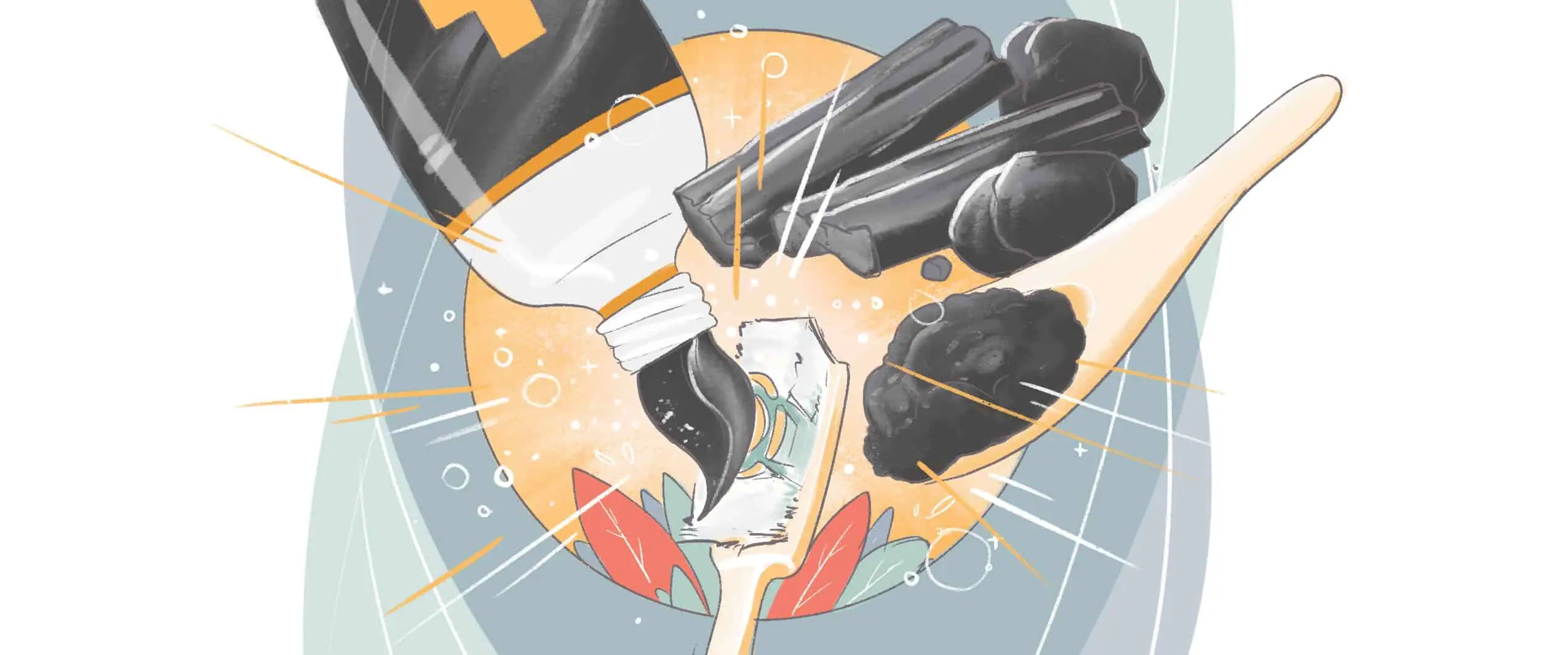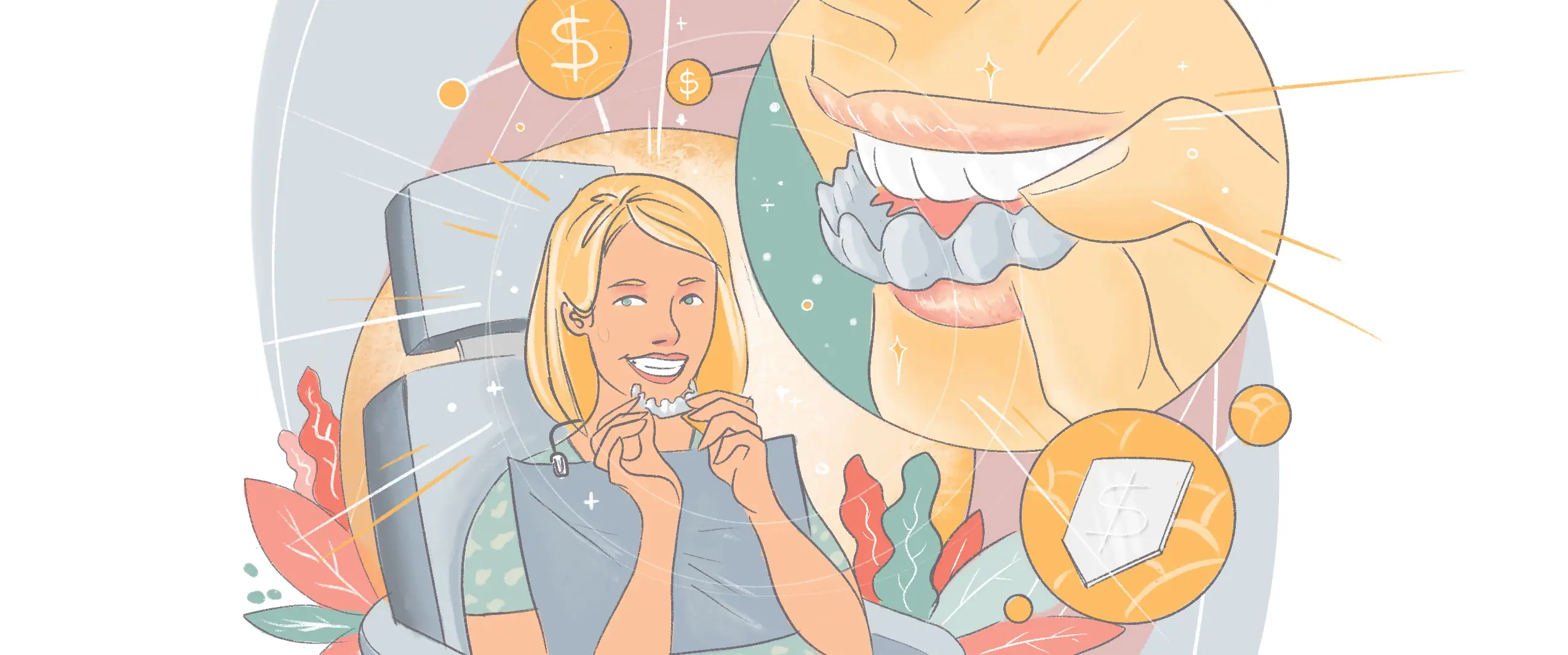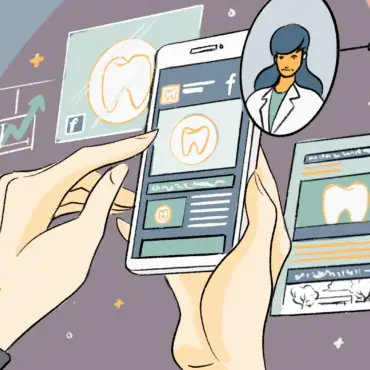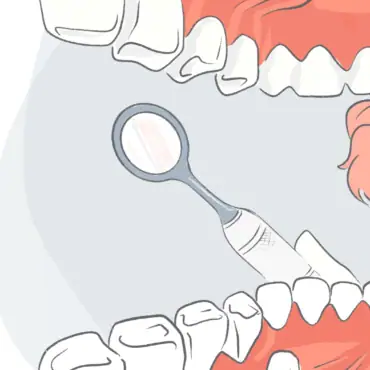Charcoal is a huge trend right now in the beauty, health and wellness, and even food industries. (Hello, charcoal ice cream!) Activated charcoal is finely ground product derived from various natural substances, including wood and coconut shells. It’s oxidized under extreme heat to achieve its composition. In the dental industry, charcoal toothpaste has emerged as a significant trend, with whitening benefits that have compelled lots of consumers to switch. But does charcoal toothpaste work?
What is charcoal toothpaste?
Manufactured with active charcoal, these toothpaste formulas help eliminate stains and toxins on the surface of the teeth. They’re also mildly abrasive, which allows them to polish and absorb all kinds of stains.
Due for a checkup?
Find a top rated dentist near you that takes your insurance.
Toothpaste manufacturers claim charcoal toothpaste whitens the teeth by dulling or removing the stains on the enamel of teeth. However, there isn’t much credible evidence to corroborate these effects or understand how charcoal works to whiten teeth.
Does charcoal toothpaste work to whiten teeth?
Charcoal first emerged as a dynamically useful oral-health ingredient when Hippocrates recommended it, and the ancient Greeks adopted its regular use. During the 1930s and 40s, charcoal chewing gums and powders emerged as popular products that freshened the mouth and promoted dental hygiene.
Today, the market is ripe with charcoal toothpaste brands, floss, and mouthwash that appeal to environmentally conscious consumers. These products come with the promise of whitening teeth and detoxifying the mouth.
Activated charcoal is a prominent treatment for overdoses and poisons, and it can readily absorb chemicals and toxins. A review published in the Journal of the American Dental Association reveals charcoal toothpaste to be effective and beneficial. The review examined several charcoal toothpaste brands and confirmed their ability to detoxify and whiten teeth.
Another study, published in the Journal of Applied Oral Sciences, attempted to study the benefits of charcoal alongside other teeth-whitening agents. The researchers stained cow’s teeth with concentrated black tea and utilized several products to evaluate their performance. While activated charcoal didn’t claim the top spot, it did show some compelling benefits.
The study revealed activated charcoal is a whitening agent that works by creating a coating around the enamel. This temporarily makes the teeth appear whiter and cleaner. The researchers discovered that using activated charcoal for four weeks led to credible teeth whitening effects. Research also showed abrasive compounds in charcoal whiten teeth by removing a layer of the tooth enamel, which carries risks with long-term use.
Enamel is the hard outer layer of our teeth, and it’s instrumental in preventing tooth decay. Removing this layer can make the teeth immensely vulnerable, sensitive, and weakened. It can also cause the teeth to become more yellow.
Many dental experts have voiced their concerns over the potential injuries regular use of charcoal can cause to the teeth. However, existing research on activated charcoal toothpaste fails to examine the safety and toxicity of these dental products. We always recommend you find a dentist for consultation if you have specific dental issues or hygiene-related concerns.
Is charcoal toothpaste safe?
Before asking yourself “does charcoal toothpaste work?”, you should ask yourself “is charcoal toothpaste safe?”. Further research is required to examine the long-term side-effects and benefits of using charcoal toothpaste. Existing research has given us the following safety precautions:
- Avoid using charcoal toothpaste daily, given its mildly abrasive composition. Regular use of an abrasive product can damage your enamel, causing the teeth to look excessively yellow due to the exposed dentin. It can also make your teeth more sensitive.
- Most of the charcoal toothpaste brands are devoid of fluoride. Fluoride is a vital ingredient that strengthens the tooth enamel and builds a strong defense against tooth decay and cavities. There is some credible evidence that associates charcoal toothpaste with an increased risk of tooth decay.
- Charcoal can cause stains as its particles can build-up in the crevices and cracks of aged teeth – as well as on on dental restorations, bridges, crowns, and white fillings. Charcoal can accumulate, creating an unsightly black outline.
What are the benefits of charcoal toothpaste?
Charcoal toothpaste offers the following benefits:
- It can aid in eliminating surface stains on the teeth
- It can clean the stains underneath the enamel
- It helps eliminate bad breath by refreshing the mouth
What are the disadvantages of charcoal toothpaste?
Using an activated charcoal toothpaste comes with the following cons:
- Its abrasive composition can damage the tooth enamel, giving the teeth a yellow appearance
- It fails to remove stains underneath the enamel
- Regular use can make the teeth highly sensitive
- Most charcoal toothpaste brands do not contain fluoride, which is vital to fight off tooth decay and cavities
- It’s not recommended for those who have undergone dental restorations, such as crowns, bridges, white fillings, and veneers
- There’s little research regarding its long-term safety and benefits
Sign up for our newsletter.
Just let us know a bit about yourself.
How often should I use charcoal toothpaste?
Little is known about the exact effects or long-term safety, so it’s wise to use charcoal toothpaste occasionally. Using it once a week or four times a month is a safer choice than regular use. Maybe even adopt charcoal toothpaste as a bi-monthly deep-clean ritual.
What is the best charcoal toothpaste?
Here are the best charcoal toothpaste brands in the market, based on popularity rankings and expert opinion:
- Hello Oral Care Activated Charcoal Teeth Whitening Toothpaste
- Tom’s of Maine Charcoal Fluoride Free Toothpaste
- Olivia Care Activated Whitening Charcoal Tooth Polish
- Schmidt’s Activated Charcoal with Wondermint
- Colgate Essentials with Charcoal Toothpaste
- My Magic Mud Charcoal Toothpaste
- Dental Expert Activated Charcoal Teeth Whitening Toothpaste
- Cali White Activated Charcoal Teeth Whitening Toothpaste
Alternatives for teeth whitening
If you’re unconvinced by the potential benefits of activated charcoal toothpaste, you can explore other teeth whitening alternatives.
Several natural home remedies can prove effective, but not as effective as commercial products and dental procedures. It’s best to consult your dentist to find out the most effective option for your specific teeth and dental hygiene.
These remedies include:
- Hydrogen peroxide, which helps eliminate stains
- Baking soda
- Apple cider vinegar, which has been used for centuries
Keep in mind these ingredients mentioned above are mildly harsh and may not prove suitable for everyone. Consult your dentist to learn more about safety precautions and sensitivity issues. Maintaining regular dental hygiene and regular brushing and flossing is vital to eliminate stains and whiten teeth naturally. It is also advisable to reduce the consumption of coffee, tea, and wine for a naturally whiter smile.
Due for a checkup?
Find a top rated dentist near you that takes your insurance.
You might also explore in-clinic whitening solutions for more effective results and higher safety standards. There are lots of safe and highly effective teeth whitening alternatives, many of which are approved by the American Dental Association (ADA). Dentists can also prescribe medically tested teeth whitening products to their patients.
Some in-clinic and medically tested alternatives include:
- Whitening strips
- In-clinic whitening treatment
- Teeth whitening products
Some dentists even offer supervised whitening sessions at home. If you’re shopping for whitening products, be sure to consult your dentist for a prescription. It’s also vital to look for the ADA seal of approval before buying a product.
More importantly, make sure your dental products include fluoride, hydrogen peroxide, and blue covarine. These whitening products are immensely effective and much safer than activated charcoal.








